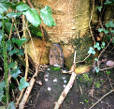Nearest to Holy Island town centre

Waren Park (5.35m)
Outdoor heated splash pool
Bar/Restaurant
Children’s play area...more

Cowslip (5.78m)
Parking
Pets allowed
Golf course (within 3 km)...more

The Haven (539.46m)
Pets allowed
Garden
Internet services...more

Lee Cottage (539.47m)
Parking
Pets allowed
Garden...more

